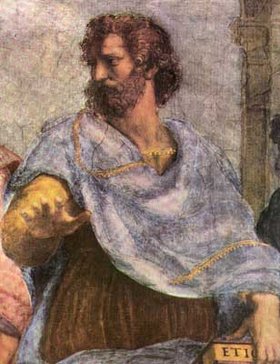More languages
More actions
(from epub around) Tag: Visual edit |
mNo edit summary Tag: Visual edit |
||
| (3 intermediate revisions by 3 users not shown) | |||
| Line 1: | Line 1: | ||
{{Adapted article}}{{Infobox philosopher|name=Aristotle|native_name=Ἀριστοτέλης|birth_date=384 BCE|death_date=322 BCE|school_tradition=[[Aristotelianism]]<br>[[Classical republicanism]]|birth_place=Stagira, Chalkidiki|death_place=Euboea, [[Macedonian Empire|Macedonia]]|image=Aristotle picture.jpg}} | |||
'''Aristotle''' (384 BCE – 322 BCE) was, along with [[Plato]], one of the greatest philosophers of antiquity. Taught in Athens, from where he had to flee a year before his death in order to escape being persecuted for impiety. As both Plato’s follower and rival, Aristotle tries to give a realistic basis to the [[Idealism|idealistic]] philosophy of the former, through the systematic observation of the perceptible world, but, like Plato, takes as his starting point the concept of “Idea.” Every being—or substance—consists of two principles: matter and form. Matter is a crude, inert and amorphous mass; in order for it to become such and such a thing, “this” or “that,” a form must be applied to it. Form equals idea, and is active and specific. It is what gives matter its qualities. The supreme form, comprising all others, is God. In this way Aristotle, by rejecting [[Democritus]]'s mechanical concept, introduces finalism: it is God who organized the universe. Aristotle was the founder of logic as the theory of correct reasoning. The idea of development is the central idea of his system. Cosmic development, organic development, the development of forms of the State are all conceived of as the evolution from the imperfect to the perfect, from the general to the specific. Engels calls him the most universal mind of all the Greek philosophers, the one who had already analyzed the most essential forms of dialectical thought. | |||
In the Middle Ages, the followers of this great scholar and logician preserved only the formal and abstract aspect of his teachings. Since they were unable to rethink Aristotelianism in the light of scientific progress, they converted it into a hardened and sterile system, which became the foundation of scholasticism. | In the Middle Ages, the followers of this great scholar and logician preserved only the formal and abstract aspect of his teachings. Since they were unable to rethink Aristotelianism in the light of scientific progress, they converted it into a hardened and sterile system, which became the foundation of scholasticism. | ||
[[Category:Ancient philosophers]] | |||
Latest revision as of 14:30, 3 September 2023
This article is adapted from an original work. It may be also be translated from the Great Soviet Encyclopedia, EcuRed, or Baidu Baike.
Aristotle Ἀριστοτέλης | |
|---|---|
 | |
| Born | 384 BCE Stagira, Chalkidiki |
| Died | 322 BCE Euboea, Macedonia |
| School tradition | Aristotelianism Classical republicanism |
Aristotle (384 BCE – 322 BCE) was, along with Plato, one of the greatest philosophers of antiquity. Taught in Athens, from where he had to flee a year before his death in order to escape being persecuted for impiety. As both Plato’s follower and rival, Aristotle tries to give a realistic basis to the idealistic philosophy of the former, through the systematic observation of the perceptible world, but, like Plato, takes as his starting point the concept of “Idea.” Every being—or substance—consists of two principles: matter and form. Matter is a crude, inert and amorphous mass; in order for it to become such and such a thing, “this” or “that,” a form must be applied to it. Form equals idea, and is active and specific. It is what gives matter its qualities. The supreme form, comprising all others, is God. In this way Aristotle, by rejecting Democritus's mechanical concept, introduces finalism: it is God who organized the universe. Aristotle was the founder of logic as the theory of correct reasoning. The idea of development is the central idea of his system. Cosmic development, organic development, the development of forms of the State are all conceived of as the evolution from the imperfect to the perfect, from the general to the specific. Engels calls him the most universal mind of all the Greek philosophers, the one who had already analyzed the most essential forms of dialectical thought.
In the Middle Ages, the followers of this great scholar and logician preserved only the formal and abstract aspect of his teachings. Since they were unable to rethink Aristotelianism in the light of scientific progress, they converted it into a hardened and sterile system, which became the foundation of scholasticism.
